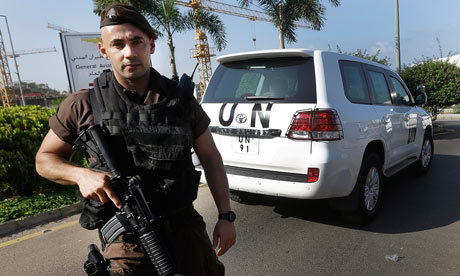Putin rubbishes chemical attack claims
Vladimir Putin has rejected US intelligence claims that Bashar al-Assad’s regime used chemical weapons in Syria, saying it would be “utter nonsense” for government troops to use such tactics in a war it was already winning.
“That is why I am convinced that [the chemical attack] is nothing more than a provocation by those who want to drag other countries into the Syrian conflict, and who want to win the support of powerful members of the international arena, especially the United States,” Putin told journalists in Vladivostok.
The Russian president also challenged the US to present its case for military intervention to the UN security council, after suggesting that if Barack Obama was worthy of his Nobel peace prize, he should think about the possible victims of any intervention by foreign forces.
UN experts left Syria on Saturday after investigating the gas attack, which killed hundreds of civilians, while the US said it was planning a limited response to punish Syria’s President Bashar al-Assad for the “brutal and flagrant” assault.
Barack Obama said the US, which has destroyers equipped with cruise missiles in the region, was planning a “limited, narrow” response that would not involve boots on the ground or be open-ended.
Russia responded by saying US threats to use military force against Syria were unacceptable and that Washington would be violating international law if it acted without the approval of the UN security council.
Putin said world powers should discuss the Syrian crisis at a meeting of the leaders of the Group of 20 developed and developing nations in St Petersburg next week. “This (G20 summit) is a good platform to discuss the problem. Why not use it?”
A poll in France revealed that most French people do not want their country to take part in military action on Syria, and most do not trust the president, François Hollande to do so.
 A Lebanese soldier watches as the UN experts arrive at Beirut international airport. Photograph: Hussein Malla/AP
A Lebanese soldier watches as the UN experts arrive at Beirut international airport. Photograph: Hussein Malla/APThe poll was published by Le Parisien-Aujourd’hui en France on Saturday, showed 64% of respondents opposed military action, 58% did not trust Hollande to conduct it and 35% feared it could “set the entire region ablaze”.
Russia opposes any military intervention in Syria, warning an attack would increase tensions and undermine the chances of ending the civil war. “Washington statements with threats to use force against Syria are unacceptable,” the Russian foreign ministry spokesman Alexander Lukashevich said in a statement late in Friday.
“Any unilateral use of force without the authorisation of the UN security council, no matter how ‘limited’ it is, will be a clear violation of international law, will undermine prospects for a political and diplomatic resolution of the conflict in Syria and will lead to a new round of confrontation and new casualties.”
Lukashevich also said that Washington’s threats were made “in the absence of any proof” of the Syrian government having used chemical weapons.
In a sign the US may be preparing to act, the secretary of state, John Kerry, spoke on Friday to the foreign ministers of key European and Gulf allies, as well as the head of the Arab League, a senior state department official said.
The team of UN weapons inspectors arrived at Beirut international airport on Saturday, after crossing the land border from Syria into Lebanon by foot earlier in the day.
The 20-member team, including experts from the Organisation for the Prohibition of Chemical Weapons, have been into the rebel-held areas in the Ghouta suburb of Damascus three times, taking blood and tissue samples from victims. They also took samples of soil, clothing and rocket fragments. They will be sent to laboratories in Europe, most likely Sweden or Finland, for analysis. The experts have already been testing for sarin, mustard gas and other toxic agents.
The analysis should establish if chemical weapons were used, but not who was responsible for the 21 August attack. Final results might not be ready for two weeks, the UN secretary general, Ban Ki-moon, told security council members, according to diplomats.
In France, Hollande said Britain’s parliamentary vote against military strikes would not affect France’s own actions.
Two other opinion polls published this week, and carried out after the Ghouta attack, indicated lukewarm support among French voters for military intervention in Syria.
Hollande, whose popularity has been hurt by economic gloom, showed unexpected military mettle when he dispatched troops to help Mali’s government fend off Islamist rebels earlier this year, an intervention backed by two-thirds of the public.


